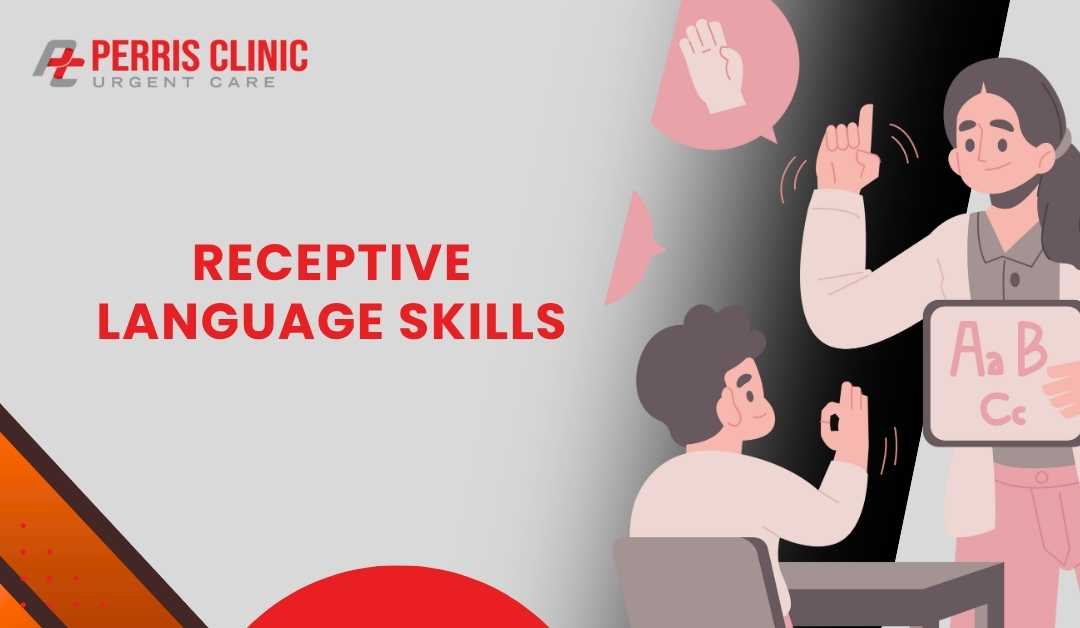Expressive vs receptive language are the two main skills we use to talk and understand others. Receptive language is how we take in words. It helps us follow directions, know what questions mean, and understand stories. Expressive language is how we share our thoughts.
We use it to name objects, ask questions, and form sentences. Both skills are crucial for kids as they grow and for adults seeking to enhance their communication skills. If one skill is weak, it can lead to language difficulties. Knowing this difference helps families seek speech therapy early.
What Is Expressive Language?
Expressive language is how we share our thoughts, ideas, and feelings with others. It is the output side of communication. We use expressive language when we talk, write, or even use gestures. For children, this skill is what allows them to ask questions, name objects, and form sentences. For adults, it is the skill that lets us tell stories, explain our thoughts, and have clear conversations.
If someone struggles with expressive language, they may have trouble finding the right words, use short or broken sentences, or avoid talking in groups. These challenges can affect school, work, and social life.
Examples of Expressive Language Skills
Here are some common signs it’s time to see a speech therapist: trouble following directions, limited vocabulary, difficulty speaking, confusion, or frustration during conversations.
- Using words to label objects or people
- Forming complex or straightforward sentences
- Telling a short story or an event in order
- Asking and answering questions
- Using gestures or facial expressions to support speech
Children often start with single words and grow into longer sentences. Adults use these same skills every day when giving directions, sharing ideas, or speaking in meetings.
Signs of Expressive Language Difficulties
Some people find it hard to express their thoughts clearly. Common signs include limited vocabulary, short sentences, trouble telling stories, and frustration when speaking.
- Limited vocabulary for their age
- Difficulty making sentences longer than a few words
- Trouble telling a story in the correct order
- Using gestures more than speech to explain things
- Getting frustrated when trying to talk
When expressive language is weak, daily life can feel harder. Children might struggle in class, and adults might avoid conversations. Speech and language therapy can help improve these skills and make talking easier and more confident.
What Is Receptive Language?
Receptive language is the skill we use to understand what others say. It is the input side of communication. When someone talks to us, we listen and make sense of their words, sentences, and tone. This skill helps us follow directions, answer questions, and enjoy stories. Without good receptive language, it can be hard to keep up in school, work, or everyday talks.
Examples of Receptive Language Skills

Receptive language includes understanding spoken words, following directions, recognizing vocabulary, grasping questions, and making sense of stories or conversations we hear every day.
- Understanding simple or long instructions
- Knowing what questions mean
- Recognizing words and their meanings
- Following stories or conversations
- Responding correctly to what we hear
Kids learn these skills early by listening and watching. Adults use receptive language every day when they follow rules, take part in meetings, or enjoy books and shows.
Signs of Receptive Language Difficulties
Some signs of trouble with receptive language include difficulty following directions, asking for repeats, confusion during conversations, and not understanding questions or stories well.
- Trouble following directions, even simple ones
- Asking people to repeat things often
- Not answering questions correctly.
- Seeming confused during talks or stories
- Acting out or getting upset when they don’t understand
These challenges can make learning and daily life harder. But speech and language therapy can help improve how we understand language. With practice, people gain confidence and feel less frustrated.
Key Differences Between Expressive and Receptive Language
Expressive and receptive language are both parts of how we communicate, but they work in different ways. Emotive language is about using words to share ideas. Receptive language is about understanding what others say. Knowing the difference can help spot where someone may need help.
Comparing Expressive and Receptive Language
| Aspect | Expressive Language | Receptive Language |
| What it means | How do we use words to talk or write | How we understand words and speech |
| Focus | Output (speaking, writing) | Input (listening, reading) |
| Skills involved | Naming, forming sentences, telling stories | Following directions, understanding questions, and recognizing vocabulary |
| Common challenges | Finding words, short sentences, and frustration | Trouble following directions, confusion, asking for repeats |
| Who it affects | Children, adults who struggle to express their thoughts | People who have difficulty understanding speech or language |
Why One Skill May Be Stronger
Sometimes, a person may understand language well but find it hard to speak or write clearly. Other times, they might say well but struggle to follow instructions or understand stories. Each case is different. Speech and language therapy can help balance these skills and improve overall communication.
How Language Therapy Can Help
Language therapy is a way to improve both expressive and receptive language skills. A speech-language pathologist works with children or adults to help them communicate more effectively. Therapy often uses fun activities like games, stories, and practice exercises to build these skills.
Read to know about speech therapy for adults: improve communication, understand language better, gain confidence, and make daily conversations easier with professional support.
What to Expect in Language Therapy
During therapy, a specialist will first do a language assessment. This helps identify which skills require the most improvement. Then, they create a plan to support those needs. Sessions may include:
- Learning new words and how to use them
- Practicing forming sentences
- Following directions and answering questions
- Using gestures and facial expressions to help communication
These activities help improve both expressive and receptive language skills, making it easier to share thoughts clearly and understand others in everyday conversations.
Why Early Support Matters
Getting help early can make a big difference. It can prevent small language delays from becoming more significant issues. Speech and language therapy helps children catch up with their peers. Adults also gain more confidence in their communication skills and understanding. Therapy works best when families and caregivers take part too.
Therapy at Perris Clinic
At Perris Clinic, therapy is designed to fit each person’s needs. The team uses friendly, patient methods that make learning easy and fun. Whether it’s for a child or an adult, the goal is to help improve communication and make daily life easier.
When to Seek Professional Help
Knowing when to ask for help with language skills is essential. If a child or adult struggles to talk or understand, it can affect learning, work, and daily life. Getting support early can make things easier.
Signs You Might Need Help
Here are some common signs it’s time to see a speech therapist: trouble following directions, limited vocabulary, difficulty speaking, confusion, or frustration during conversations.
- Trouble following simple directions
- Limited vocabulary for age or situation
- Difficulty making sentences longer than a few words
- Trouble understanding questions or stories
- Using gestures more than words to explain
- Frustration during conversations or avoiding talking
These signs can affect daily life, making it hard to learn, communicate, or connect with others. Early help improves skills and builds confidence.
Why Early Evaluation Matters
When you notice these signs, it’s good to get a language assessment. The earlier you start, the better the chances of improving skills. Speech and language therapy can help fix problems before they grow. It also gives tools to handle daily communication with confidence.
How Perris Clinic Can Support You
At Perris Clinic, the team offers easy and caring evaluations. They listen carefully and make plans that fit each person’s needs. Whether you need help for a child or an adult, support is just a call or visit away.
Start Your Language Therapy Journey at Perris Clinic
If you or your loved one needs help with language skills, Perris Clinic is here to support you. The clinic offers speech and language therapy for both children and adults. The team is patient, friendly, and focused on making therapy easy and effective.
Easy Steps to Get Started
Booking a consultation is simple. You can call the clinic, send a message, or use the online booking system. During your first visit, the therapist will get to know you and understand your needs. No special preparation is needed; just be yourself.
Why Choose Perris Clinic?
Perris Clinic uses proven methods to help improve expressive and receptive language skills. Their approach is personal and caring, focusing on your goals. The clinic is local, making it easy to visit regularly.
Take the First Step Today
Don’t wait if you notice language difficulties. Early therapy can make a big difference. Contact Perris Clinic now to book your consultation. Let the experts help you or your loved one speak and understand with confidence.
FAQs About Expressive and Receptive Language
What causes expressive or receptive language delays?
Language delays can happen for many reasons. Sometimes it’s due to hearing problems, brain development, or medical conditions. Other times, a child may just need more time or practice to learn.
Can adults have expressive or receptive language disorders?
Yes, adults can face language difficulties, too. These may result from stroke, brain injury, or illnesses that affect communication skills. Speech therapy can help adults improve their language.
How long does therapy usually take?
Therapy length varies by person. Some improve in a few months, while others need more extended support. A speech-language pathologist will create a plan based on individual needs.
Is therapy available online or in person?
Many clinics, including Perris Clinic, offer both in-person and online sessions. This makes therapy easier to fit into busy schedules and helps people get support from home.
Is speech therapy effective for dementia?
Speech therapy can help people with dementia improve their communication skills and manage difficulties better. It supports daily life and social interaction.
Conclusion
Expressive and receptive language skills are both important for good communication. Understanding the difference helps you notice when support is needed. If you or someone you care about struggles with talking or understanding, speech and language therapy can make a real difference. Early help leads to better progress and more confidence. At Perris Clinic, the team is ready to guide you through every step. Taking the first step toward therapy can improve daily life and bring ease to conversations.

